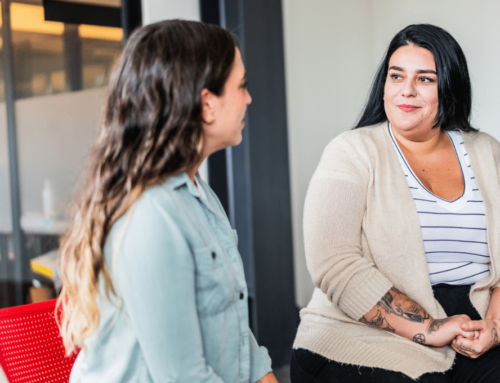September is National Suicide Prevention Month. According to the American Foundation for Suicide Prevention, suicide is the 10th leading cause of death in the United States. We’ve taken a rigorous, proactive approach by adopting the foundational belief that suicide deaths are preventable and establishing the Zero Suicide Implementation Team at Oaks Integrated Care.
By creating a culture that’s informed about mental health and makes suicide prevention a priority, we can save lives together. Unfortunately, there are many common myths about suicidal behaviors, feelings and thoughts. Understanding these myths is essential to reducing the stigma and creating a supportive environment.
MYTH #1: “If I talk about suicide, I am planting a seed or encouraging someone to consider suicide.”
Research indicates that talking about suicide and asking someone if they have had suicidal thoughts/urges actually reduces the stigma associated with suicide, decreasing both suicidal ideation and suicide attempts. A core belief of Zero Suicide is that talking directly about suicide allows an individual to receive the help they need, explore effective treatments, and experience the care and compassion essential to their healing.
MYTH #2: “If someone talks about suicide, they are not really suicidal.”
Believing this myth is very dangerous. When loved ones open up about being suicidal, others frequently think they are “seeking attention” or trying to be “manipulative.” In Zero Suicide, every statement regarding suicide is taken seriously and addressed immediately with care and support. Individuals who talk about suicide are usually contemplating it.
MYTH #3: “Being hospitalized is the best treatment for someone with suicidal ideation.”
For many years and continuing in most community-based treatment programs today, when someone mentions being “suicidal,” staff can encourage the individual to visit a screening center or the Emergency Department. Zero Suicide has determined that the least restrictive setting is the most desirable in treating suicide. Often follow up contact (phone calls, postcards, etc.) and support are successful in diminishing an individual’s suicidality.
MYTH #4: “Suicide is selfish.”
Typically, those who face suicide are feeling helpless and hopeless. Often suffering from tremendous pain, they can believe they are a burden to others who care for and about them. Unfortunately, they are not simply being “selfish” but truly see no other solution.
MYTH #5: “Suicide only affects individuals with a mental health condition.”
Studies show that 54% of individuals who face suicide did not have a diagnosable mental health disorder. Relationship problems, criminal/legal matters, eviction/loss of a home/job, death of a loved one, debilitating illness, trauma, sexual abuse and rejection often are associated with suicide attempts and deaths.
MYTH #6: “Once an individual is suicidal, they will always remain suicidal.”
Active suicidality is often short term and situation specific. Once the deep, painful thoughts that contribute to an individual’s suicidality are diminished/resolved, the individual can resume a healthy, fulfilling life.
MYTH #7: “Most suicides happen suddenly without warning.”
Warning signs – verbal or behavioral – precede most suicides. Therefore, it is essential to learn and understand the warning signs associated with suicide. Many times, individuals who are suicidal may only show warning signs to those closest to them. Loved ones may not recognize these signs which is why many think the suicide was sudden or without warning.
You are not alone! If you or a loved one are struggling, there is support and help available.
The National Suicide Prevention Lifeline at 800-273-8255
New Jersey Suicide Prevention Hopeline at 1-855-654-6735
If you or someone you know is experiencing a crisis, please call our confidential point of entry: (856) 428-4357 (HELP). If at any time you are at imminent risk of harm, please call 911 immediately.
For more information about Oaks Integrated Care mental health services, call our Access Center at 1-800-963-3377 or fill out a contact form today.








